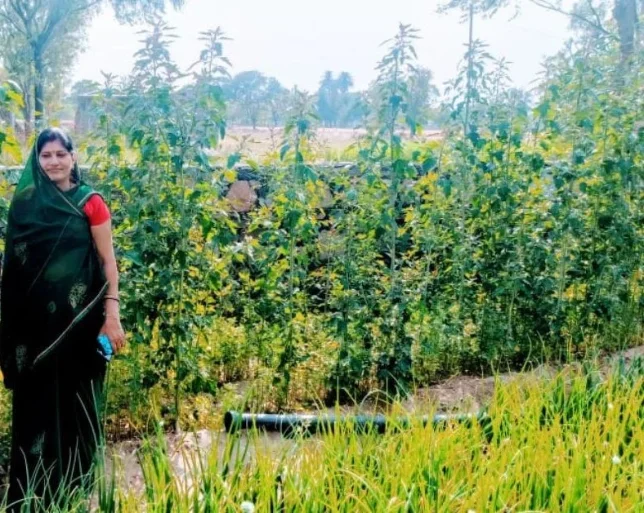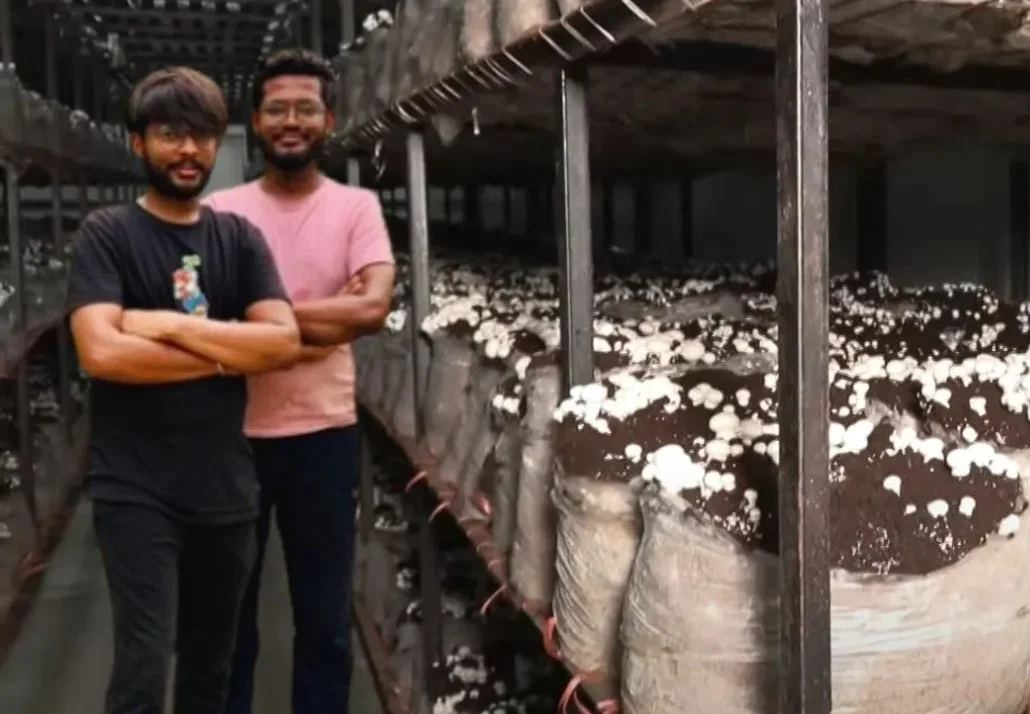Working for a big technology company in a bustling city is a dream that many people share, but it wasn’t the case for Roja Reddy. Roja, who grew up in Donnehalli, a rural village in Karnataka, had a deep passion for agriculture and dreamed of becoming a farmer.
However, her family, who had been engaged in farming for generations, had different plans for her—they wanted her to secure a well-paying job in the city rather than working the land.
In compliance with her family’s wishes, Roja pursued a Bachelor of Engineering (BE) degree and landed a job in a well-known company in Bengaluru. She continued with her corporate job, setting aside her dream of farming for the time being. It wasn’t until the COVID-19 pandemic struck in 2020 that she revisited her long-held desire.
When her company shifted to remote work, she headed back home and finally decided to give organic farming a shot.
“My father and brother work as full-time farmers, but they faced significant losses and were on the brink of giving up entirely. Even though they were hesitant about me getting into farming, I felt the need to do something. I took it as a challenge to revive our family farm using organic methods. I started working in the fields after 4 pm, once my official work hours were over,” Roja shares.
“My family wasn’t initially convinced that I could rejuvenate the land using organic practices. They had been relying on chemical fertilizers for years, and that had led to a decline in our farm’s productivity. However, after putting in a lot of hard work, I managed to prove them wrong,” says the 26-year-old.

Today, Roja has left her corporate job and embraced a full-time role as a farmer, cultivating organic vegetables on a vast 50-acre piece of land. According to her, she now generates an annual revenue of approximately Rs 1 crore.
Roja shares that when she ventured into organic farming in 2020, her family, particularly her father and brother, were against her decision. Even her relatives and fellow villagers questioned why she would choose farming over a well-paying corporate job.
“The villagers believed that only chemical farming could yield better results, which turned out to be the opposite. While growing up, I witnessed my grandfather practicing organic farming. However, my father and brother relied on chemicals for so long that it led to a significant decline in the soil quality, resulting in low productivity,” she explains.
In the drought-prone Chitradurga district’s Donnehalli village, her family utilized only six out of the 20 acres of farmland to cultivate pomegranates. The remaining land was left unused due to challenges in irrigation.
Roja asked her family for permission to cultivate the unused land, and she established her organic vegetable farm on six acres.
When Roja first ventured into farming, she faced criticism for choosing organic techniques from her relatives, fellow farmers, villagers, and even officials from the horticulture department.
“I delved into extensive research on organic farming through online resources and reached out to several successful farmers for guidance. With their support, I managed to establish my own organic vegetable farm in just a few months,” she shares. In the beginning, she cultivated around 40 different varieties of vegetables, including beans, brinjals, and capsicum.
Roja took the extra step of creating her own organic fertilizers and pesticides, such as jeevamrut, neemastra, agniastra, and more, to ensure the well-being of her crops.
Although Roja successfully transformed chemically treated land into a thriving organic farm, she encountered a significant challenge when it came to marketing her produce.
Also Read: Retiree Makes Rs 35 Lakh/Year from his Innovative Fruit & Cacao Farm

“I never anticipated how difficult it would be to sell organic produce. Despite harvesting hundreds of kilograms of vegetables, finding a market was a struggle,” she shares. “People in my village and nearby areas were unfamiliar with organic farming and its products. They lacked awareness about the quality and benefits, leading to a lack of demand.”
To overcome this hurdle, Roja took proactive measures. She traveled to various places across the state. “I traveled to various taluks and initially assembled a team of eight organic farmers from Chitradurga. We approached local authorities in each taluk, requesting space to set up a market for our produce. Additionally, we went door-to-door, spreading awareness about organic vegetables and inviting people to our weekly markets held in different areas,” she explains.
Over time, more organic farmers from different parts of the state joined Roja’s network.
Roja extended her market reach to various districts, including Udupi and Dakshina Kannada.

“At present, my network consists of around 500 farmers throughout Karnataka. For the past year, we’ve been organizing organic markets across the state, and we’ve started receiving substantial orders from cities like Bengaluru,” says Roja. She also founded her own brand, Nisarga Native Farms, which has partnered with some retail outlets in Bengaluru.
Within a year, Roja not only successfully transformed her family’s land into a thriving organic farm but also created a market for her produce.
After demonstrating her dedication and expertise, she shares that her family became fully supportive of her passion, leading her to make the decision to leave her corporate job and become a full-time farmer.
Addressing another obstacle, Roja highlights the irrigation challenge in the drought-prone district of Chitradurga. “Organic farming has the advantage of requiring less water compared to conventional methods. However, finding a practical solution for irrigation was crucial. In addition to the three borewells on my land, I dug two ponds for rainwater harvesting,” says Roja, who has implemented a drip irrigation system for her farm.
Being a trailblazer in organic farming in her village, Roja now finds several farmers, including those who initially doubted her, seeking her guidance to learn about organic farming.

“So far, approximately 25 farmers in my village have transitioned to organic farming with my assistance. I also support them in selling their produce directly through markets, eliminating the need for middlemen and ensuring they earn a decent income,” she adds.
Starting with six acres, Roja has expanded her farm to cover 50 acres, cultivating approximately 20 varieties of vegetables. These include different types of tomatoes, beans, carrots, brinjal, ladies fingers, bottle gourds, bitter gourds, chillies, and cucumbers.
“I harvest between 500 kg to 700 kg of vegetables every day, resulting in an annual income of around Rs 1 crore,” shares Roja. Additionally, she mentions that her farm provides employment to about 10 villagers.









